Advertisements
Fuse box diagram (fuse layout), location, and assignment of fuses Mitsubishi L200 (2005, 2006, 2007, 2008, 2009, 2010, 2011, 2012, 2013, 2014, 2015).
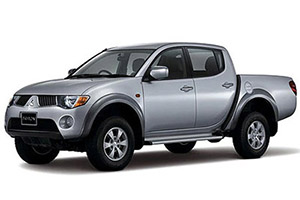
Checking and Replacing Fuses
To prevent damage to the electrical system from short-circuiting or overloading, each individual circuit is equipped with a fuse.
Use the fuse location diagrams and the matching tables, to check the fuse that is related to the problem. Look through the clear side of the fuse to see if the metal wire inside is separated. If it is, the fuse is blown and should be replaced. Use a fuse puller (placed on the instrument panel fuse box cover) to remove the fuses. Clamp it on the fuse you wish to remove, and pull the fuse straight out from the fuse block. Insert a new fuse of the same capacity securely into the appropriate slot.
If the fuse is not blown, something else must be causing the problem. Have the system inspected by your authorized Mitsubishi Motors dealer or a repair facility of your choice
Notice
- Before replacing a fuse, always turn off the electrical item concerned to the fuse and turn the ignition switch to the “LOCK” position or put the operation mode in OFF.
- Do not repair fuses and never use a fuse with a capacity greater than the one listed or any substitute, such as wire, foil, etc. This would cause the circuit wiring to heat up and could cause a fire.
- If the replacement fuse blows again after a short time, have the electrical system checked by an authorized Mitsubishi Motors dealer or a repair facility of your choice to find and correct the cause.
The fuse capacity and the name of the electrical systems protected by the fuses are indicated on the inside of the fuse lid located at the driver’s leg area and on the inside of the fuse block cover for fuses located in the engine compartment.
Instrument Panel Fuse Box
The fuse block in the passenger compartment is located behind the cover in front of the driver’s seat at the position shown in the illustration. Pull the fuse lid (A) to remove it.
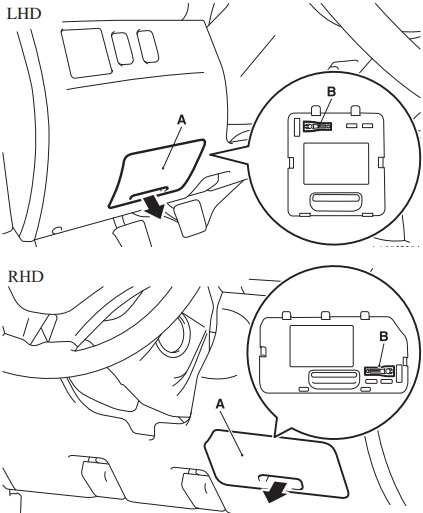
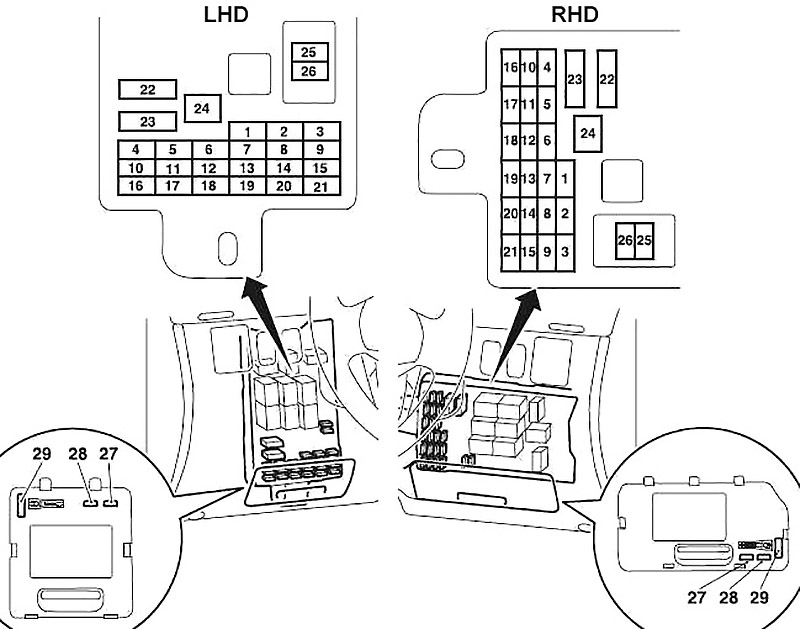
Advertisements
| № | Function | A |
|---|---|---|
| 1 | Tail lamp (left) | 7.5 |
| 2 | Cigarette lighter | 15 |
| 3 | Ignition coil | 10 |
| 4 | Starter motor | 7.5 |
| 5 | Sunroof | 20 |
| 6 | Accessory socket | 15 |
| 7 | Tail lamp (right) | 7.5 |
| 8 | Outside rear-view mirrors | 7.5 |
| 9 | Engine control unit | 7.5 |
| 10 | Control unit | 7.5 |
| 11 | Rear fog lamp | 10 |
| 12 | Central door lock | 15 |
| 13 | Room lamp | 10 |
| 14 | Rear window wiper | 15 |
| 15 | Gauge | 7.5 |
| 16 | Relay | 7.5 |
| 17 | Heated seat | 20 |
| 18 | Option | 10 |
| 19 | Heated door mirror | 7.5 |
| 20 | Windscreen wiper | 20 |
| 21 | Reversing lamps | 7.5 |
| 22 | Demister | 30 |
| 23 | Heater | 30 |
| 24 | Power seat | 40 |
| 25 | Radio | 10 |
| 26 | Electronic controlled unit | 15 |
| 27 | Spare fuse | 7.5 |
| 28 | Spare fuse | 20 |
| 29 | Spare fuse | 30 |
The fuse block does not contain spare 10 A and 15 A fuses. If a fuse of one of these capacities blows, replace it temporarily by borrowing the one that matches from:
- 10 A: Radio
- 15 A: Cigarette lighter
Replace the borrowed fuse as soon as possible
Advertisements
Engine Compartment Fuse Box
In the engine compartment, the fuse block is located as shown in the illustration.
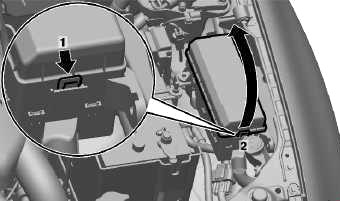
- Push the knob.
- Remove the cover.
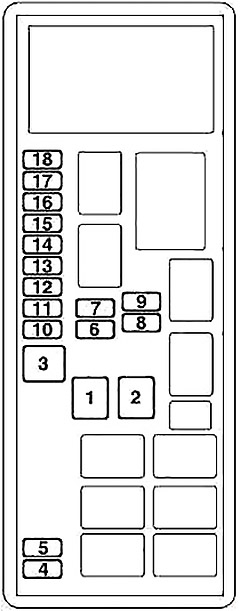
| № | Function | A |
|---|---|---|
| 1 | — | — |
| 2 | Electric window system | 40 |
| 3 | Ignition switch | 40 |
| 4 | Air conditioning compressor | 10 |
| 5 | Condenser fan motor | 20 |
| 6 | Headlamp high-beam (left) | 10 |
| 7 | Headlamp high-beam (right) | 10 |
| 8 | Headlamp low beam (left) | 10 |
| 9 | Headlamp low beam (right) | 10 |
| 10 | Engine control | 20 |
| 11 | Alternator | 7.5 |
| 12 | Stop lamps | 15 |
| 13 | Horn | 10 |
| 14 | Automatic transmission | 20 |
| 15 | Hazard warning flasher | 10 |
| 16 | Fuel pump | 15 |
| 17 | Front fog lamps | 15 |
| 18 | Audio amp | 20 |
Advertisements
